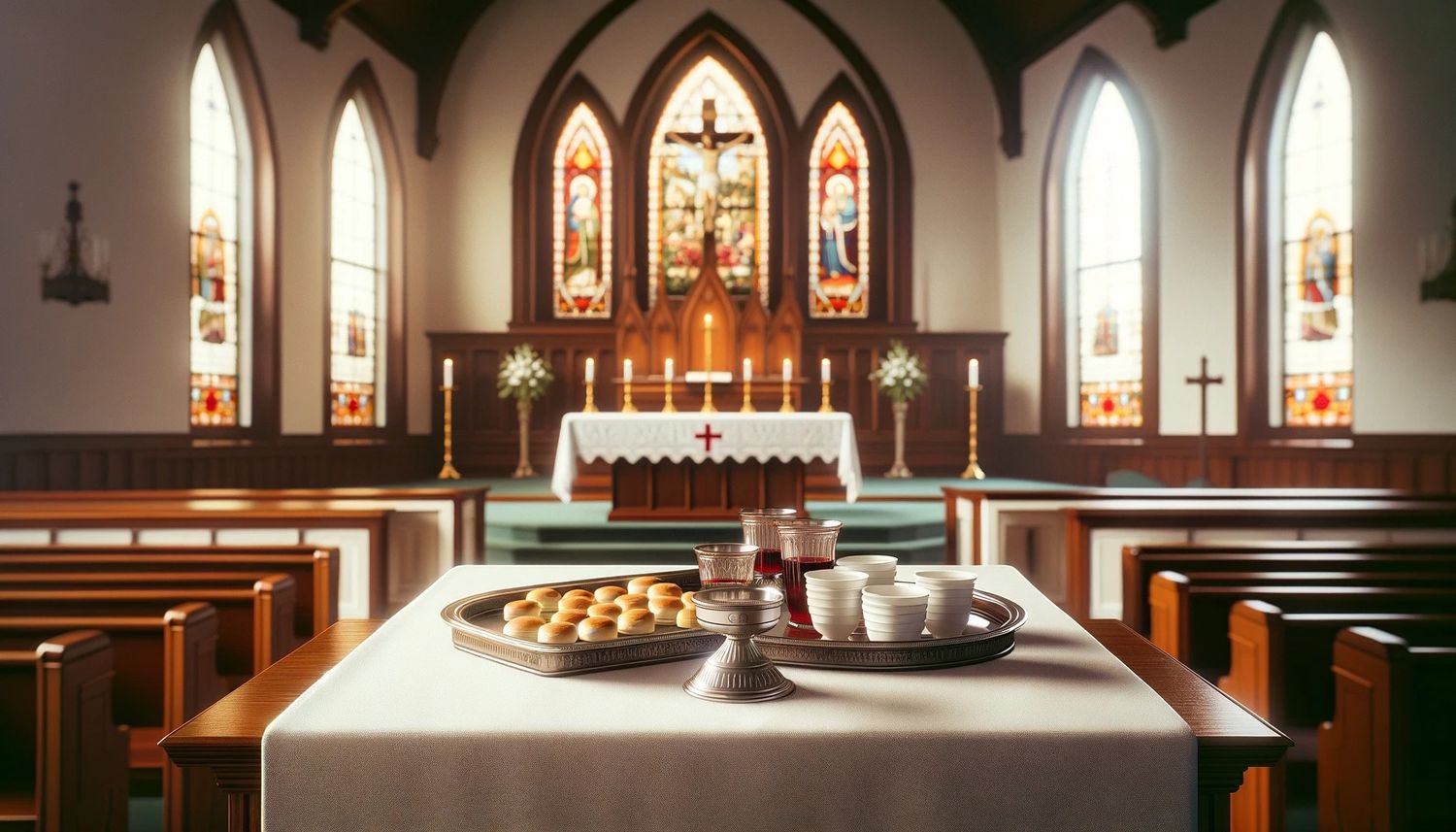Home>Theology and Spirituality>How Should A Baptist Church Choose A Deacon


Theology and Spirituality
How Should A Baptist Church Choose A Deacon
Published: February 22, 2024
Peter Smith, Editorial Director at Christian.net, combines deep insights into faith, politics, and culture to lead content creation that resonates widely. Awarded for his contributions to religious discourse, he previously headed a major organization for religious communicators, enhancing dialogue on faith's societal impacts.
Learn how a Baptist church can effectively select a deacon with a focus on theology and spirituality. Discover the key considerations and best practices for this important role.
(Many of the links in this article redirect to a specific reviewed product. Your purchase of these products through affiliate links helps to generate commission for Christian.net, at no extra cost. Learn more)
Table of Contents
Introduction
The role of a deacon in a Baptist church is one of great significance, as deacons are entrusted with the responsibility of serving the congregation and supporting the church leadership. The process of selecting deacons is a crucial decision that requires careful consideration and adherence to biblical principles. In this article, we will explore the qualifications for deaconship, the selection process, the role and responsibilities of deacons, as well as the importance of providing adequate training and support for individuals serving in this capacity.
The position of a deacon is deeply rooted in the New Testament, where the apostles appointed seven men to oversee the distribution of food to widows in the early Christian community. This act of service was a demonstration of the compassionate and caring nature of deacons, reflecting their commitment to meeting the practical needs of the church body. Today, the role of a deacon continues to embody these foundational principles, as deacons are called to exemplify servant leadership and selfless dedication to the well-being of the church.
As we delve into the qualifications for deaconship, it is essential to recognize that the biblical standards for deacons are outlined in 1 Timothy 3:8-13. These qualifications encompass various aspects of character, including being dignified, sincere, and not indulging in excessive drinking. Additionally, deacons are expected to be faithful in their marriages, demonstrating a strong commitment to their families. By upholding these standards, deacons serve as role models within the church community, inspiring others through their exemplary conduct and devotion to God.
The selection process for deacons is a pivotal aspect of church governance, as it involves discerning individuals who exhibit the necessary qualifications and possess a heart for serving others. This process typically involves prayerful consideration, seeking the guidance of the Holy Spirit, and evaluating the character and spiritual maturity of potential candidates. It is a decision that should not be taken lightly, as deacons play a vital role in supporting the pastoral staff, ministering to the congregation, and contributing to the overall spiritual health of the church.
In the subsequent sections of this article, we will explore the specific qualifications for deaconship, the process of selecting deacons, their role and responsibilities within the church, as well as the importance of providing ongoing training and support to equip deacons for effective ministry. Through this exploration, we aim to provide valuable insights into the significance of deaconship within the context of a Baptist church, emphasizing the integral role that deacons play in nurturing a thriving and spiritually vibrant community of believers.
Read more: How To Become A Deacon In A Baptist Church
Qualifications for Deaconship
The qualifications for deaconship, as outlined in 1 Timothy 3:8-13, serve as a foundational framework for identifying individuals who are called to serve in this esteemed role within the Baptist church. These qualifications encompass a range of attributes that reflect the character, integrity, and spiritual maturity expected of deacons.
First and foremost, deacons are called to be dignified and respectable individuals who exemplify a deep reverence for God and a sincere commitment to upholding the teachings of the Scriptures. Their conduct should reflect humility and a genuine desire to serve others, setting a compelling example for the congregation through their words and actions.
Furthermore, the qualifications emphasize the importance of deacons being individuals of integrity, possessing a clear conscience and unwavering devotion to the principles of righteousness. This includes being truthful, trustworthy, and free from any hint of dishonesty or deceit, thereby earning the trust and confidence of those they serve.
In addition to their character, deacons are expected to exercise self-control and exhibit moderation in all aspects of their lives. This encompasses abstaining from excessive drinking and avoiding any behavior that may compromise their spiritual sobriety and moral uprightness. By demonstrating discipline and temperance, deacons uphold a standard of moral purity that reflects the transformative work of the Holy Spirit in their lives.
Moreover, the qualifications for deaconship emphasize the importance of deacons being individuals of sound judgment, possessing the ability to make wise and discerning decisions in various situations. This includes being level-headed, fair-minded, and capable of offering practical and spiritual guidance to those in need, thereby contributing to the overall welfare of the church community.
Additionally, the qualifications highlight the significance of deacons being individuals who are committed to their families, demonstrating faithfulness in their marital relationships and providing loving leadership within their households. This aspect underscores the holistic nature of deaconship, recognizing the interconnectedness of personal character and familial responsibilities within the context of serving the church.
Overall, the qualifications for deaconship set a high standard for individuals who are called to this role, emphasizing the integral relationship between character, spiritual maturity, and the ability to serve with humility and dedication. By embodying these qualifications, deacons play a pivotal role in fostering a culture of spiritual growth, compassion, and servant leadership within the Baptist church, thereby enriching the lives of the congregation and glorifying God through their exemplary service.
Selection Process
The selection process for deacons in a Baptist church is a sacred and deliberate undertaking that requires careful discernment and prayerful consideration. It is a process that seeks to identify individuals who not only meet the biblical qualifications for deaconship but also exhibit a genuine heart for serving and ministering to the needs of the congregation. The following steps outline the essential components of the selection process for deacons:
-
Prayerful Consideration: The process commences with fervent prayer, seeking the guidance of the Holy Spirit in discerning individuals who are called to serve as deacons. This foundational step underscores the spiritual nature of the selection process, acknowledging the need for divine wisdom and discernment in identifying individuals who align with the biblical standards for deaconship.
-
Evaluation of Qualifications: Prospective deacons are evaluated based on the qualifications outlined in 1 Timothy 3:8-13. This involves assessing their character, integrity, spiritual maturity, and commitment to upholding the principles of servant leadership. The evaluation process is conducted with a spirit of grace and humility, recognizing that all individuals are on a journey of growth and transformation in their faith.
-
Nomination and Recommendation: Members of the congregation may have the opportunity to nominate individuals whom they believe exemplify the qualities of a deacon. These nominations are accompanied by recommendations that provide insights into the nominee's character, service-oriented mindset, and willingness to support the church community.
-
Pastoral Oversight and Discernment: The pastoral leadership plays a pivotal role in overseeing the selection process, offering pastoral discernment and guidance in identifying individuals who demonstrate a genuine calling to serve as deacons. Pastoral input and oversight provide valuable insight into the spiritual maturity and relational dynamics of potential deacons within the context of the church community.
-
Confirmation and Appointment: Upon careful consideration and prayerful deliberation, individuals who align with the biblical qualifications and exhibit a heart for serving are confirmed and appointed to serve as deacons. This appointment is a significant affirmation of their commitment to serving the congregation and supporting the church leadership in advancing the mission and vision of the church.
The selection process for deacons is a sacred journey that reflects the collective discernment and spiritual unity of the church body. It is a process that honors the biblical standards for deaconship while recognizing the unique calling and gifting of individuals to serve in this vital capacity. Through prayer, discernment, and a commitment to upholding the principles of servant leadership, the selection process seeks to identify individuals who will wholeheartedly embrace the responsibilities of deaconship and contribute to the spiritual flourishing of the church community.
Role and Responsibilities
The role of a deacon in a Baptist church encompasses a diverse array of responsibilities that are centered on serving the congregation, supporting the pastoral leadership, and fostering a culture of compassion and care within the church community. Deacons serve as vital pillars of support, embodying the principles of servant leadership and selfless dedication to meeting the practical and spiritual needs of the church body.
Ministering to the Congregation
Deacons are called to minister to the congregation with a heart of compassion and empathy. This involves actively engaging with the members of the church, offering spiritual encouragement, and providing practical assistance to those in need. Whether it involves visiting the sick, comforting the grieving, or offering a listening ear to those facing challenges, deacons play a pivotal role in demonstrating Christ-like love and care to the congregation.
Supporting Church Leadership
In collaboration with the pastoral staff, deacons provide invaluable support in various facets of church ministry. This may include assisting in the coordination of worship services, facilitating outreach initiatives, and participating in the administration of sacraments such as baptism and communion. By working closely with the church leadership, deacons contribute to the cohesive functioning of the church, ensuring that the spiritual and practical needs of the congregation are effectively addressed.
Promoting Unity and Fellowship
Deacons play a significant role in fostering unity and fellowship within the church community. Through their servant-hearted approach and commitment to building meaningful relationships, deacons contribute to the nurturing of a supportive and cohesive church family. This may involve organizing fellowship events, facilitating small group gatherings, and actively participating in initiatives that promote a sense of belonging and togetherness among the members of the congregation.
Exemplifying Servant Leadership
At the core of their responsibilities, deacons exemplify servant leadership, mirroring the humility and selflessness demonstrated by Jesus Christ. Their service is characterized by a willingness to sacrificially invest their time, talents, and resources for the betterment of others. By embodying the principles of servant leadership, deacons inspire and encourage the congregation to embrace a similar mindset of humility and service.
Administrative and Practical Support
Deacons often provide essential administrative and practical support to ensure the smooth functioning of church operations. This may involve overseeing benevolence ministries, managing logistical aspects of church events, and coordinating volunteer efforts within the congregation. Their behind-the-scenes contributions are instrumental in facilitating the effective execution of various church initiatives and programs.
Read more: How To Be A Deacon In The Lutheran Church
Spiritual Guidance and Discipleship
In alignment with their role, deacons offer spiritual guidance and support to individuals seeking counsel and mentorship. They may engage in discipleship relationships, providing wisdom, prayer, and biblical insight to those navigating spiritual challenges or seeking to deepen their faith. By investing in the spiritual growth of the congregation, deacons contribute to the overall vitality and maturity of the church body.
In summary, the role and responsibilities of deacons in a Baptist church are multifaceted, encompassing a blend of compassionate ministry, supportive collaboration with church leadership, and the embodiment of servant leadership principles. Through their dedicated service, deacons play a pivotal role in nurturing a thriving and spiritually vibrant church community, reflecting the love and grace of Christ in all aspects of their ministry.
Training and Support
The provision of comprehensive training and ongoing support for deacons is paramount in equipping them for the multifaceted responsibilities inherent in their role within a Baptist church. This aspect of ministry acknowledges the significance of nurturing and empowering deacons to effectively serve the congregation, engage in collaborative ministry with church leadership, and embody the principles of servant leadership with excellence.
Ongoing Education and Enrichment
Continuous education and enrichment opportunities form the cornerstone of training for deacons. This may encompass participation in theological courses, workshops on pastoral care and counseling, and seminars focused on leadership development. By engaging in ongoing education, deacons deepen their understanding of biblical principles, enhance their pastoral skills, and cultivate a heart for compassionate ministry, thereby enriching their capacity to serve the church community effectively.
Mentorship and Discipleship
Establishing mentorship relationships with seasoned church leaders and experienced deacons provides invaluable guidance and support for individuals serving in this role. Through mentorship and discipleship, deacons benefit from the wisdom, experience, and pastoral insight of mentors, enabling them to navigate the complexities of ministry with confidence and humility. This relational investment fosters a culture of continuous learning and growth, nurturing the next generation of servant leaders within the church.
Read more: In The Baptist Church What Is A Deacon
Emotional and Spiritual Care
Recognizing the emotional and spiritual demands associated with serving in a pastoral capacity, providing avenues for emotional and spiritual care is essential. This may involve access to pastoral counseling, peer support groups, and resources for personal spiritual renewal. By prioritizing the emotional and spiritual well-being of deacons, the church demonstrates a commitment to nurturing their holistic health, ensuring that they are equipped to minister from a place of spiritual vitality and emotional resilience.
Collaborative Ministry Development
Encouraging collaborative ministry development initiatives fosters a sense of unity, shared vision, and mutual support among deacons. This may involve regular gatherings for prayer, fellowship, and strategic planning, creating opportunities for deacons to collaborate, share insights, and collectively discern the most effective approaches to serving the congregation. By fostering a culture of collaboration, deacons are empowered to leverage their collective strengths and gifts in advancing the mission and ministry of the church.
Practical Skills Training
Equipping deacons with practical skills training in areas such as conflict resolution, effective communication, and pastoral visitation enhances their ability to navigate the diverse challenges encountered in pastoral ministry. By honing these practical skills, deacons are better prepared to address the varied needs of the congregation, engage in constructive dialogue, and provide compassionate care in a manner that reflects the love and grace of Christ.
In essence, the provision of comprehensive training and ongoing support for deacons underscores the commitment of the church to invest in the development, well-being, and effectiveness of those called to serve in this vital capacity. By prioritizing training and support, the church equips deacons to fulfill their responsibilities with excellence, compassion, and unwavering dedication, thereby enriching the spiritual life of the congregation and advancing the kingdom of God.
Conclusion
In conclusion, the selection and appointment of deacons in a Baptist church is a sacred and discerning process that hinges on the biblical qualifications, spiritual discernment, and a heart for servant leadership. The role of deacons is deeply rooted in the New Testament principles of compassionate service, humility, and dedication to meeting the practical and spiritual needs of the church community. As individuals called to exemplify the character of Christ through their service, deacons play a pivotal role in nurturing a thriving and spiritually vibrant church environment.
The qualifications for deaconship, as outlined in 1 Timothy 3:8-13, set a high standard for individuals aspiring to serve in this capacity. These qualifications encompass various facets of character, integrity, and relational dynamics, reflecting the holistic nature of deaconship within the context of family, church, and community. By upholding these qualifications, deacons serve as role models, inspiring others through their exemplary conduct and unwavering commitment to serving with humility and dedication.
The selection process for deacons involves prayerful consideration, pastoral oversight, and discernment, culminating in the confirmation and appointment of individuals who align with the biblical qualifications and exhibit a genuine heart for serving. This process reflects the collective discernment and spiritual unity of the church body, acknowledging the unique calling and gifting of individuals to serve as deacons within the context of the church community.
The role and responsibilities of deacons encompass a diverse array of compassionate ministry, supportive collaboration with church leadership, and the embodiment of servant leadership principles. Through their dedicated service, deacons contribute to the spiritual flourishing of the church community, fostering unity, providing practical assistance, and exemplifying Christ-like love and care to the congregation.
Furthermore, the provision of comprehensive training and ongoing support for deacons is instrumental in equipping them for the multifaceted responsibilities inherent in their role. By prioritizing training, mentorship, and emotional and spiritual care, the church invests in the holistic well-being and effectiveness of deacons, empowering them to serve with excellence and unwavering dedication.
In essence, the appointment and support of deacons in a Baptist church reflect the commitment of the church to uphold the principles of servant leadership, nurture a culture of compassion and care, and advance the mission and ministry of the church. Through their selfless dedication and unwavering commitment to serving others, deacons embody the timeless principles of servant leadership, enriching the lives of the congregation and glorifying God through their exemplary service.












